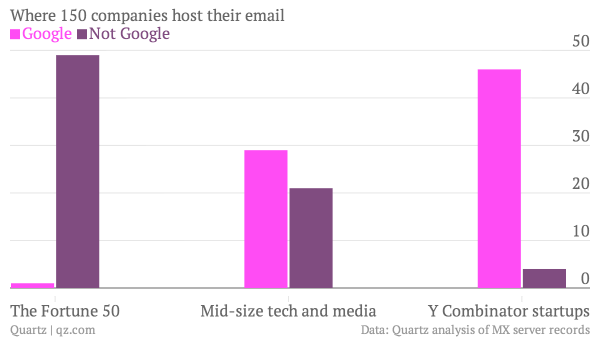One more time
I have worked all my career in enterprise IT, either as a sysadmin, or for vendors of enterprise IT tools. There are many annoyances in big-company IT, but one of the most frustrating is when people miss key aspects of what makes corporate IT tick.
One area is the difference between a brand-new startup whose entire IT estate consists of a handful of bestickered MacBooks, and a decades-old corporation with the legacy IT that history brings. Case in point: Google is stealing away Microsoft’s future corporate customers.

Basically, it turns out that - to absolutely nobody's surprise - startups overwhelmingly use Google's email services. Guess what? Running your own email server for just a few users is not a highly differentiating activity, so it makes sense to hand it off to Google. Big companies on the other hand have a legacy that means it makes sense to stick with what they have and know, which generally means Microsoft Exchange.
So far, so good. The key factor that is missing in this analysis is time. What happens when those startups grow to become mid-size companies or even join the Fortune 50 themselves? Do they stick with Google's relatively simple services, or do they need to transition at some point to an "enterprise" email solution?
It is now clear that Google does deep inspection of email contents. So far, this appears to be done for good: Paedophile snared as Google scans Gmail for images of child abuse. However, if I were in a business that competes with Google - and these days, that could be anything - I would feel distinctly uncomfortable about that.

There are also problems of corporate policy and compliance that apply to proper grown-up companies. At the simplest level, people often have their own personal Gmail accounts as well, and with Google's decision to use that login for all their services, there is enormous potential for bleed-over between the two domains. At a more complex level, certain types of data may be required to be stored in such a way that no third parties (such as Google) have access to them. Gmail would not work for that requirement either.
Simply put, startups have different needs from big established corporations. The impact of full-time IT staff on small startup is huge. The alternative of doing your own support doesn't work either, because every hour spent setting up, maintaining or troubleshooting IT infrastructure is an hour that you don't spend working on your actual product. For a big corporation with thousands of employees, on the other hand, it makes a lot of sense to dedicate a few to in-house IT support, especially if the alternatives include major fines or even seeing managers go to jail. The trend Quartz identified is interesting, but it's a snapshot of a point in time. What would be more interesting would be to see the trend as those companies grow and change from one category to another.
Corollary to this is that business IT is not consumer IT. Trying to mix the two is a recipe for disaster. Big B2B vendors end up looking very silly when they try to copy Apple, and journalists look just as silly when they fail to understand key facts about the differences between B2B and consumer IT, and between small-company IT and big-company IT.
Image by Philipp Henzler via Unsplash